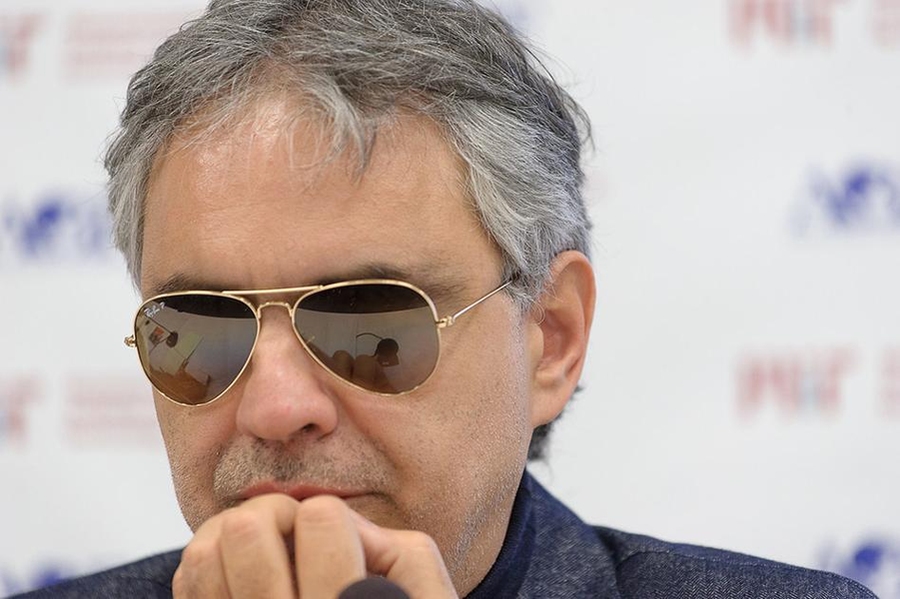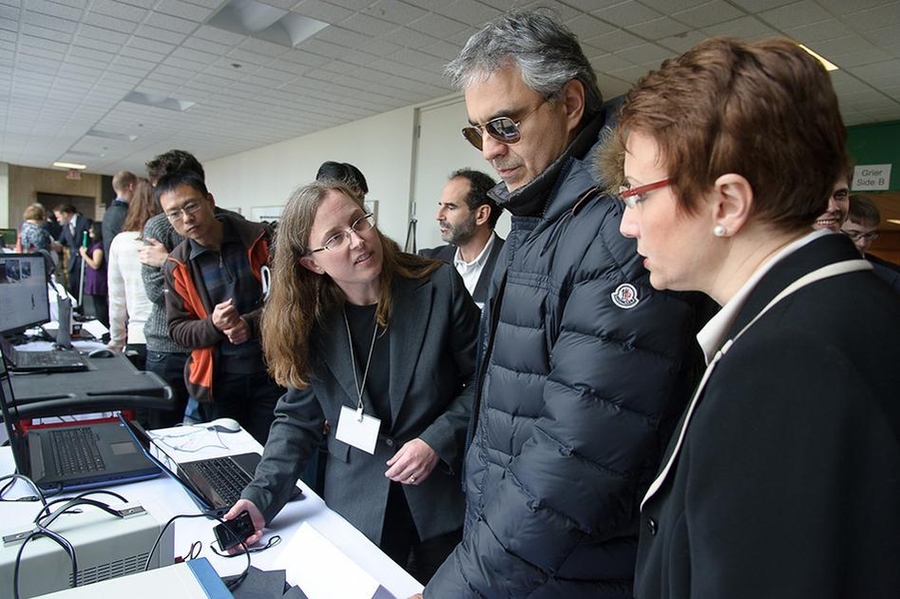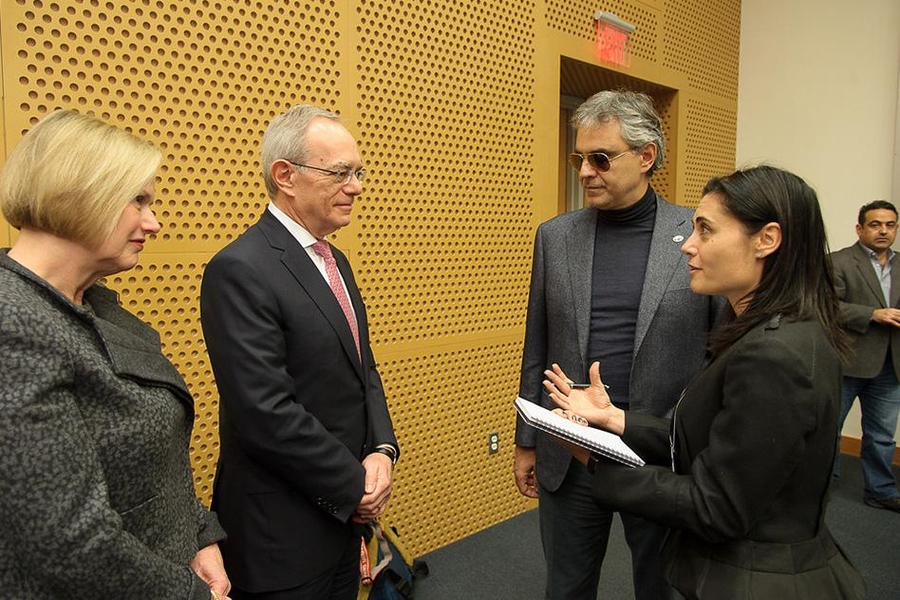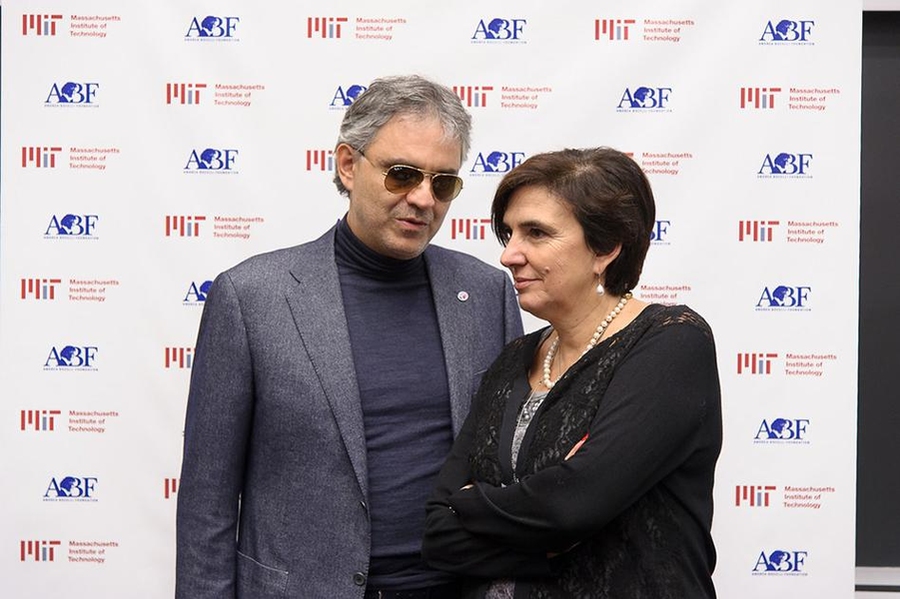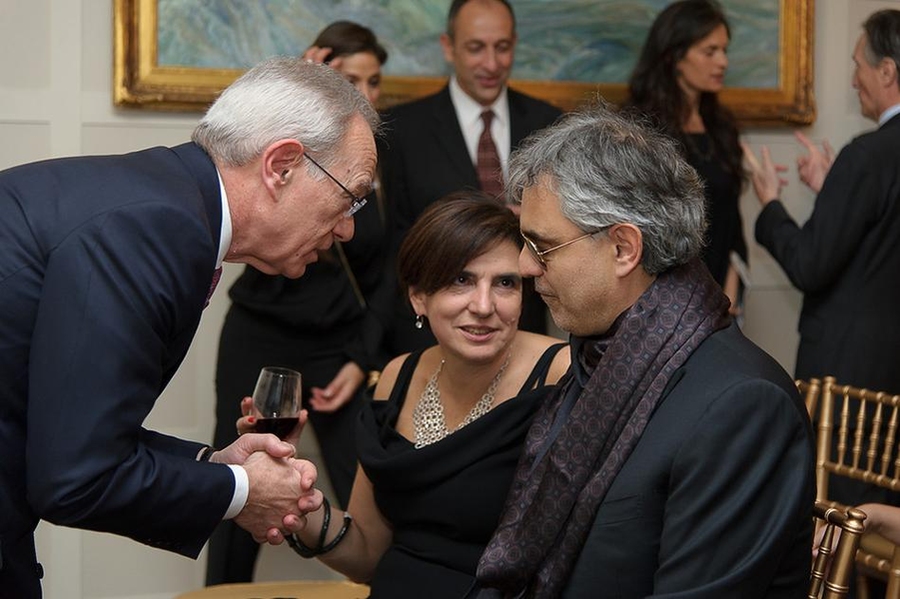“Imagine a 6-year-old kid about to start school. The kid has only known his local village, the local fields,” Italian tenor Andrea Bocelli said at MIT on Friday. “This is a place that kid would have imagined was close to the stars. That kid, of course, was me.”
Bocelli, who became blind after a childhood accident, visited MIT in support of the Andrea Bocelli Foundation’s (ABF) funding of research on assistive technologies for the blind and for reducing global poverty.
Speaking through a translator, Bocelli described the origin of his partnership with MIT: “It was born here in Boston two or three years ago, when, after a concert, I met Professor Munther Dahleh. We discussed the idea to create a device that could act as a substitute for the eyes. The answer I got from Professor Dahleh was, ‘Yes, we can.’”
While admitting that this research may help him personally, Bocelli said his primary motivation was helping others who are blind or visually impaired: “I have friends who have issues with going to work or grocery shopping, locating items on the shelves. The issue is having the ability to live independently.”
Seth Teller, a professor of computer science and engineering in MIT’s Computer Science and Artificial Intelligence Lab (CSAIL), described the goal of MIT’s Fifth Sense project as “developing portable, wearable devices that [can] enable blind and visually impaired people to participate independently in daily activities.” Most of the millions of blind and visually impaired people around the world “are simply left behind” in work and education, Teller said. “We’re pursuing a multidisciplinary approach to solving these problems in the real world.”
Teller detailed a number of challenges ahead: “The world is full of hazards,” from curbs to poles and more. A wearable device would have to be comfortable and socially acceptable. Other challenges include collecting and transmitting information about the user’s surroundings, such as “notifying a user when people approach” and “decoding texts and symbols” from the surroundings, Teller said. A final obstacle is the user interface, which must allow for privacy while transmitting information fast enough for users to act upon it.
“Many of the ideas that were impossible decades ago are now possible,” Teller said, “but we’re trying to go from impossible to possible in principle, to practical and usable by real people, and finally to devices that are affordable. We’re early on the road to satisfying these requirements.”
Assistive technology devices were exhibited as part of Bocelli’s visit. CSAIL postdoc Nick Wang and senior Chelsea Finn demonstrated a wearable text recognizer that first scans the likeliest places for text, such as on vertical surfaces, and then zooms in to decode that text for the user. “You start by making a map of the environment and then zoom in to isolate text,” Finn explained. “The decoding of the text is more demanding computationally,” Wang added, “because you need higher image quality.”
Pierluigi Gallo, a professor at the University of Palermo, displayed a smartphone-based navigation system for the blind featuring a tactile interface that vibrates when the user is following the right path. A wi-fi network would disseminate path information, Gallo said, describing the application as “both practical and relatively simple to implement.”
The all-day “Challenges 2013” workshop included panel discussions on various obstacles facing assistive technology research, from computer vision to crowdsourcing to user interface design, and included researchers from multiple disciplines at MIT, Italian universities, and elsewhere.
At a midmorning press event, Bocelli drew chuckles when he explained his role in ABF-funded projects: “I do almost nothing. My main role is raising funds, so the big challenge for me is to continue singing well or maybe to begin singing well.” (Bocelli has sold almost 100 million albums worldwide.) Teller and Laura Giarré of the University of Palermo, co-chairs of the “Challenges 2013” workshop, quickly refuted Bocelli’s tongue-in-cheek claim of limited involvement. “We are inspired by Andrea,” Teller emphasized, ”and he is a frank participant in what we are doing.” Giarré added, “Andrea is involved in all of our decisions.”
In the afternoon, the focus shifted to fighting poverty. Bocelli opened a “Break the Barriers” workshop attended by Claudio Bisogniero, Italy’s ambassador to the United States, and hosted by MIT’s Abdul Latif Jameel Poverty Action Lab. The workshop focused on reducing poverty through education, clean water projects, and environmental protection efforts, as well as emphasizing the use of scientific data and methods to assess the impact of such programs.
Jaebets Gille, director of a Haitian vocational school, praised Bocelli’s humanitarian efforts: “It’s amazing for us. Andrea feels the love to help undeveloped countries. It’s about heart-thinking. He can’t see the images [of poverty], but he can feel the needs and has responded.”
Bocelli ended the day with a challenge for researchers: “We need to solve the problems first, before worrying about cost,” he said. “My invitation to the MIT scientists: Go ahead with your research and then we will do something about lowering the cost later.” Bocelli finished with a smile and two final words spoken in English: “Good luck!”
Bocelli, who became blind after a childhood accident, visited MIT in support of the Andrea Bocelli Foundation’s (ABF) funding of research on assistive technologies for the blind and for reducing global poverty.
Speaking through a translator, Bocelli described the origin of his partnership with MIT: “It was born here in Boston two or three years ago, when, after a concert, I met Professor Munther Dahleh. We discussed the idea to create a device that could act as a substitute for the eyes. The answer I got from Professor Dahleh was, ‘Yes, we can.’”
While admitting that this research may help him personally, Bocelli said his primary motivation was helping others who are blind or visually impaired: “I have friends who have issues with going to work or grocery shopping, locating items on the shelves. The issue is having the ability to live independently.”
Seth Teller, a professor of computer science and engineering in MIT’s Computer Science and Artificial Intelligence Lab (CSAIL), described the goal of MIT’s Fifth Sense project as “developing portable, wearable devices that [can] enable blind and visually impaired people to participate independently in daily activities.” Most of the millions of blind and visually impaired people around the world “are simply left behind” in work and education, Teller said. “We’re pursuing a multidisciplinary approach to solving these problems in the real world.”
Teller detailed a number of challenges ahead: “The world is full of hazards,” from curbs to poles and more. A wearable device would have to be comfortable and socially acceptable. Other challenges include collecting and transmitting information about the user’s surroundings, such as “notifying a user when people approach” and “decoding texts and symbols” from the surroundings, Teller said. A final obstacle is the user interface, which must allow for privacy while transmitting information fast enough for users to act upon it.
“Many of the ideas that were impossible decades ago are now possible,” Teller said, “but we’re trying to go from impossible to possible in principle, to practical and usable by real people, and finally to devices that are affordable. We’re early on the road to satisfying these requirements.”
Assistive technology devices were exhibited as part of Bocelli’s visit. CSAIL postdoc Nick Wang and senior Chelsea Finn demonstrated a wearable text recognizer that first scans the likeliest places for text, such as on vertical surfaces, and then zooms in to decode that text for the user. “You start by making a map of the environment and then zoom in to isolate text,” Finn explained. “The decoding of the text is more demanding computationally,” Wang added, “because you need higher image quality.”
Pierluigi Gallo, a professor at the University of Palermo, displayed a smartphone-based navigation system for the blind featuring a tactile interface that vibrates when the user is following the right path. A wi-fi network would disseminate path information, Gallo said, describing the application as “both practical and relatively simple to implement.”
The all-day “Challenges 2013” workshop included panel discussions on various obstacles facing assistive technology research, from computer vision to crowdsourcing to user interface design, and included researchers from multiple disciplines at MIT, Italian universities, and elsewhere.
At a midmorning press event, Bocelli drew chuckles when he explained his role in ABF-funded projects: “I do almost nothing. My main role is raising funds, so the big challenge for me is to continue singing well or maybe to begin singing well.” (Bocelli has sold almost 100 million albums worldwide.) Teller and Laura Giarré of the University of Palermo, co-chairs of the “Challenges 2013” workshop, quickly refuted Bocelli’s tongue-in-cheek claim of limited involvement. “We are inspired by Andrea,” Teller emphasized, ”and he is a frank participant in what we are doing.” Giarré added, “Andrea is involved in all of our decisions.”
In the afternoon, the focus shifted to fighting poverty. Bocelli opened a “Break the Barriers” workshop attended by Claudio Bisogniero, Italy’s ambassador to the United States, and hosted by MIT’s Abdul Latif Jameel Poverty Action Lab. The workshop focused on reducing poverty through education, clean water projects, and environmental protection efforts, as well as emphasizing the use of scientific data and methods to assess the impact of such programs.
Jaebets Gille, director of a Haitian vocational school, praised Bocelli’s humanitarian efforts: “It’s amazing for us. Andrea feels the love to help undeveloped countries. It’s about heart-thinking. He can’t see the images [of poverty], but he can feel the needs and has responded.”
Bocelli ended the day with a challenge for researchers: “We need to solve the problems first, before worrying about cost,” he said. “My invitation to the MIT scientists: Go ahead with your research and then we will do something about lowering the cost later.” Bocelli finished with a smile and two final words spoken in English: “Good luck!”
